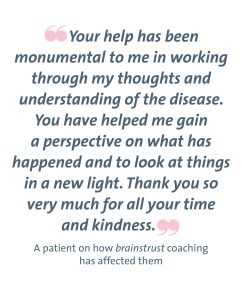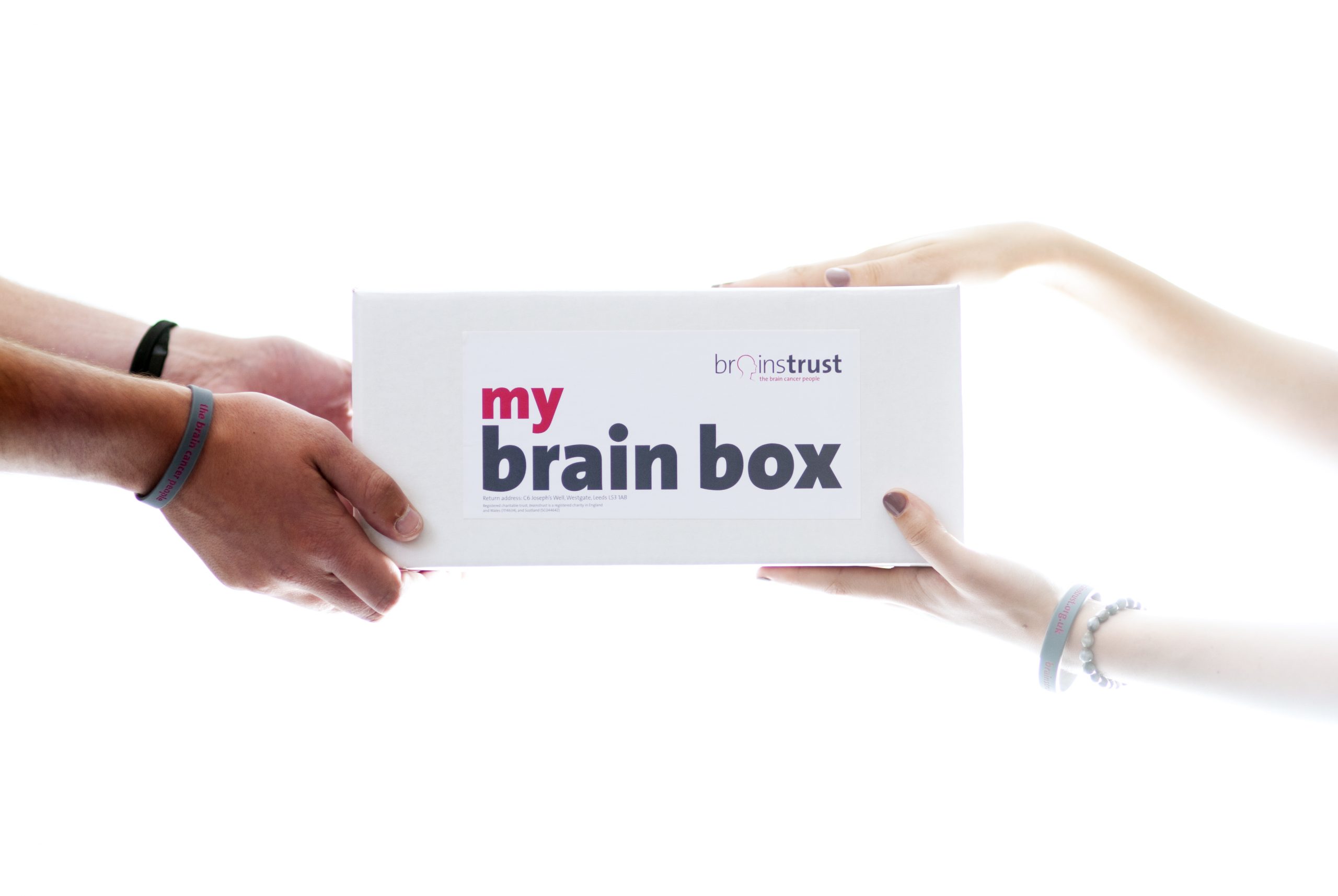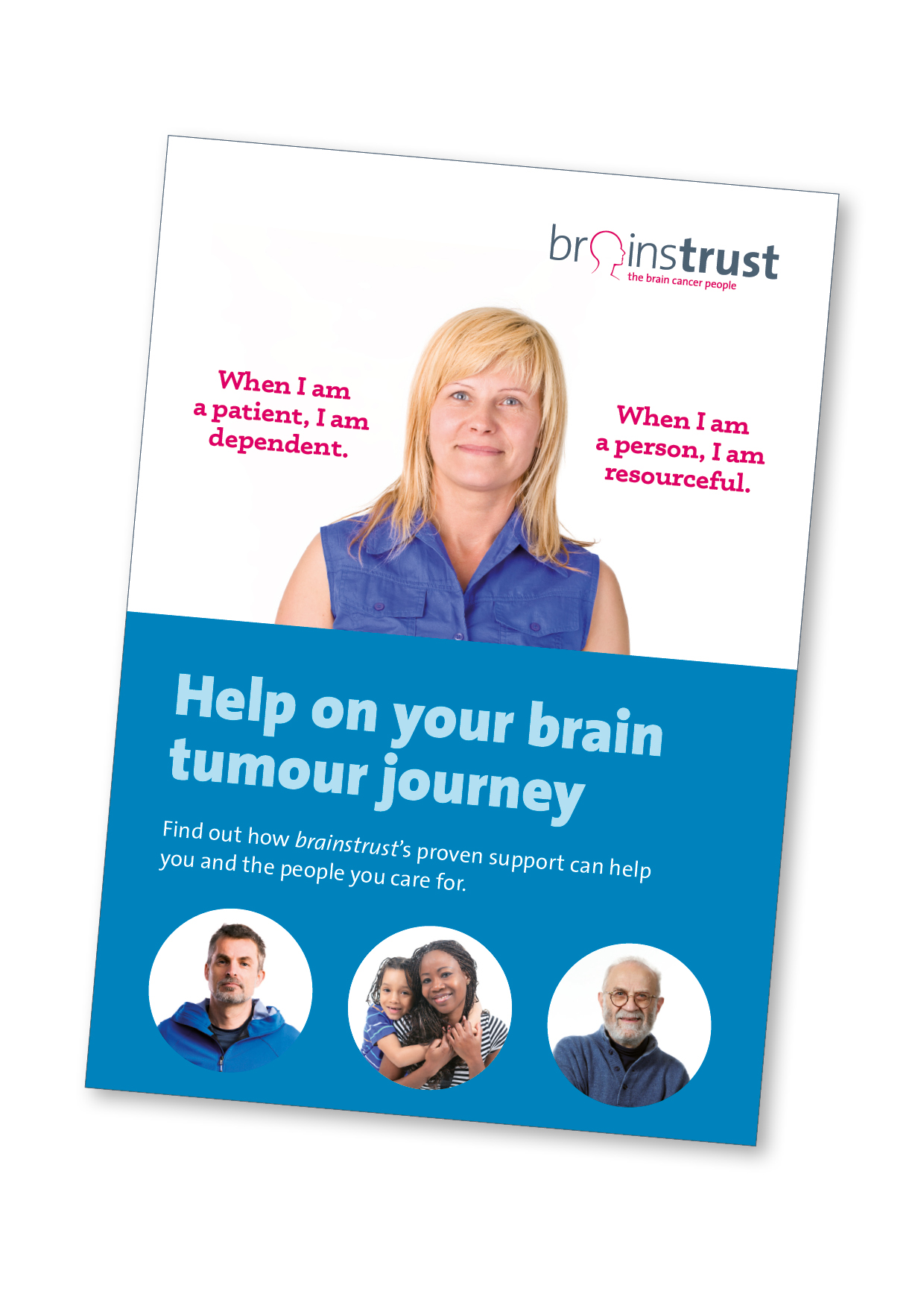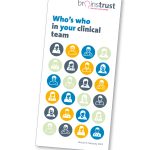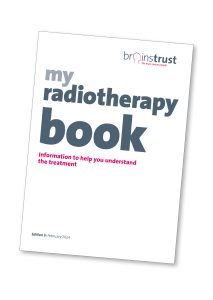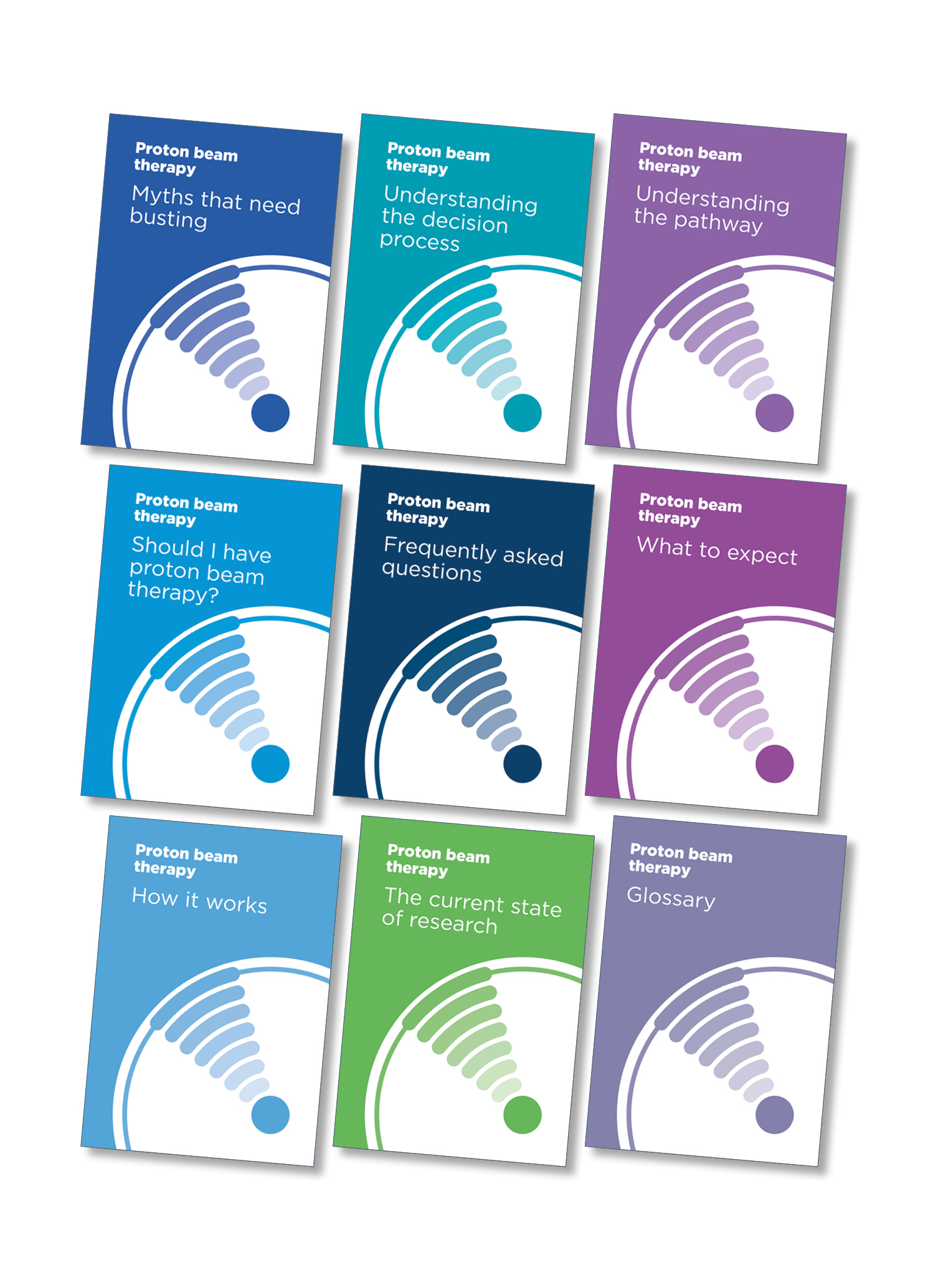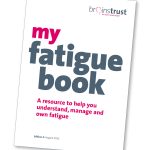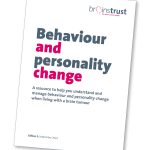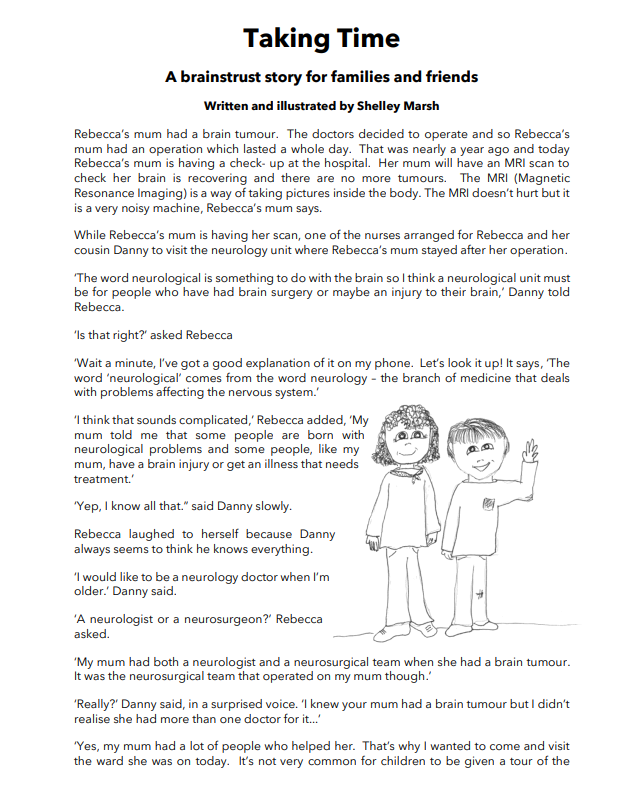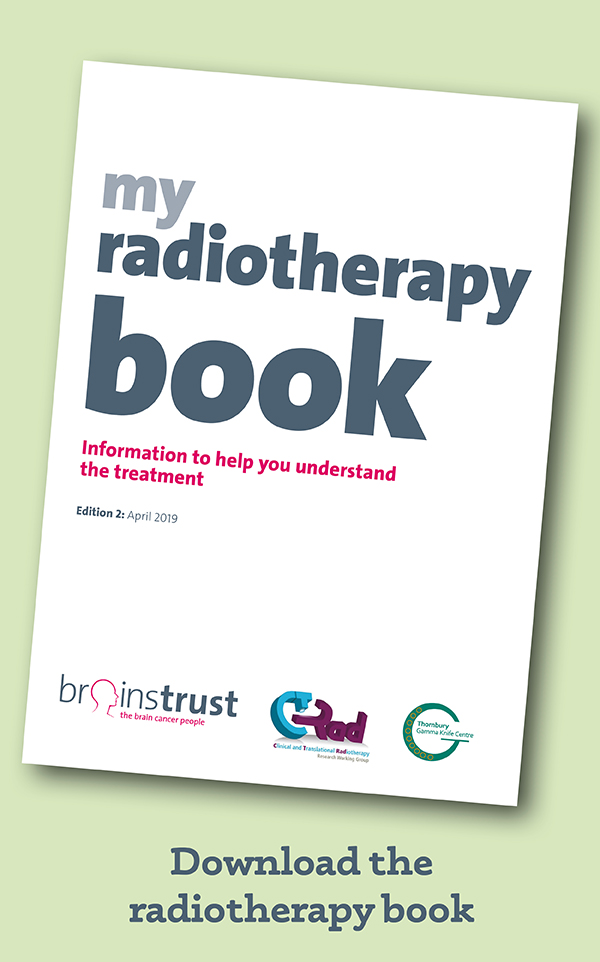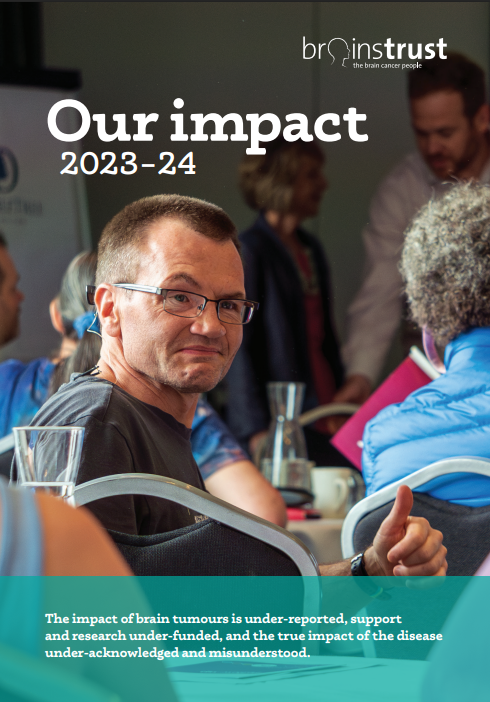Downloads and resources
brainstrust resources are designed to help you feel more informed, in control and engaged with your care, no matter where you are on your brain tumour journey. Here you’ll find links to download our resources and request a brain box. If you’d like hard copies rather than downloadable versions, please email hello@brainstrust.org.uk
The brain box
The brainstrust brain box is a must have support toolkit for people with a new brain tumour diagnosis and their caregivers. Fully customisable, with resources relevant to your unique situation, the brain box also comes with treats like teabags and self-care items to remind you to take time to look after yourself.
Feel confident, not confused
When you or someone you love has a brain tumour, the fabric of your life is torn apart. It can feel like chaos rules your life and you are out of control. These resources will equip you with the information you need to feel confident and in control.
The brainstrust support catalogue
The brainstrust support catalogue takes you through the various ways brainstrust can support you. It’s a great starting point to find out more about what we do and how we can help you.
The brain tumour patient guide
The 2018 brain tumour patient guide is freely available to brain tumour patients and doctors and nurses working in relevant specialties. It explains the care you should be getting, as suggested by the latest NICE guidelines.
Know hows for practical advice
Having access to practical information is key to knowing what support is available. These know hows cover topics provide you with practical information and further reading to help you know your options.
Who’s who in your clinical team
brainstrust has developed this resource with the National Hospital for Neurology and Neurosurgery, to help you navigate your journey, understanding who makes up your team and what roles they have when it comes to your treatment and care.
My radiotherapy book
If radiotherapy is a potential treatment option for you, or you have recently had radiotherapy, then this resource will help you understand the treatment and feel more in control.
Proton beam therapy (PBT) guides
These guides offer independent, factual information available on PBT and what it offers, helping you put proton beam therapy in context with respect to other treatments.
Radiotherapy book for teens and young adults
Living with a brain tumour is complex. This is never more so than when you are a teenager or young adult who has been diagnosed with a brain tumour. This booklet should help you understand the range of radiotherapy treatments that are currently available and why one might be more appropriate for you over another.
I have been diagnosed with a brain metastasis
This resource includes information for people living with a brain metastasis (secondary brain tumour). You will find information about brain mets, symptoms and treatment, as well as available support.
Feel on top of things, not overwhelmed
A brain tumour diagnosis can make you feel as if your life is spiralling out of control. These resources will help equip you with the skills and tools to break down the overwhelm, so you can start taking control and making the decisions that are best for you.
Know Hows for taking control
These Know Hows cover a range of topics designed to help you take control of what is happening at the moment and develop strategies to help you to find a way forward.
My fatigue book
This resource is really important as it enables patients and caregivers living with a brain tumour to understand what is meant by fatigue and to self-manage brain cancer related fatigue.
Behaviour and personality change (BPC)
Up to 60% of people diagnosed with a brain tumour experience BPC, and until now there has little support available for this.
Click here to download the behaviour and personality change resource, and download a mood journal template here.
Feel prepared, not panicked
A brain tumour diagnosis throws you into a world of unknowns. Our resources can help you navigate the through the panic to a place where you have the information you need to take control of your brain tumour journey. The resources in this section will help you navigate through the panic and feel prepared and equipped to face the road ahead.
Know hows for treatment information
These Know Hows cover a range of topics related to brain tumour treatment to help you feel better resourced and more engaged with your clinical care, so you be confident making decisions.
End-of-life care
This resource has been produced with people who have the lived experience of what it is like to care for someone with a brain tumour at end-of-life, with leading consultants in palliative care and clinical nurse specialists who are hospice-based. Having as much information to hand as possible allows you to be in control, certain that you are making the right decisions for those concerned.
What to expect if you are diagnosed with a suspected brain tumour
This leaflet will help you to cope with the fear and uncertainty of a suspected brain tumour. It explains what you can expect to happen next, so you can feel more informed and more in control after your scans.
How to have a difficult conversation guide
We know how hard it is, explaining brain cancer, and having to hold those difficult conversations. This guide helps families with approaching these moments, so that you can hold better conversations and feel more in control.
We also have a resource tailored to family members who need to talk to children about their brain surgery. You can download the resource and find out how to use it here.
A guide for talking about advanced cancer
When a brain tumour recurs it is an entirely different situation from an initial diagnosis. So it is important that you have the right kinds of conversations when this happens, so that you can decide what is important to you and your loved ones.
Click here to download the Advanced Cancer Coalition’s guide to talking about advanced cancer.
Tips from a brain tumour patient’s caregiver
In this resource, a couple share their tips for when someone you love has been diagnosed with a brain tumour: including questions it’s OK to ask, the best ways to offer support, and lots more.
The Snaggle Tooth Splat
More and more parents of children with brain cancer are getting in touch to express their confusion at the diagnosis that their child has received, and also for advice on how to broach the diagnosis with their children. There is a general feeling of loss of control immediately after a diagnosis.
The Snaggle Tooth Splat is designed to help here. The 28-page illustrated book enables parents to educate their children about what they are going through, and explains what brainstrust and clinicians are doing to help them. The book can also be used to explain to children what a newly diagnosed parent may be going through.
The book has been written by Karen Boswell, illustrated by Jason Mortimer and sponsored by Learning Curve. The foreword is by actress, brainstrust supporter and star of the brainstrust BBC Radio 4 appeal, Julie Walters CBE.
The writer Karen Boswell and the illustrator Jason Mortimer, who donated their professional services free of charge, worked closely with health care professionals from the neuro-oncology field to ensure the book met its objectives as effectively as possible. We then tested the book with nurses, parent carers, and school audiences. Both the initiative and execution have been exceptionally well received.
Help fund our mission
These resources are driving a 20%* improvement in wellbeing for people living with a brain tumour.
Help us get these tools into the hands of more people every day with a donation of £5 each month.
*To see a full breakdown of our impact data, see our impact report.
Did this information make you feel more resourced, more confident or more in control?
Our health information is designed to help you feel better resources, more confident and more in control when you are living with a brain tumour diagnosis and it is important to make sure that the resources continue to do this. To help us make sure that the information we produce is as useful as it can be, it would be great if you could take a few minutes to complete our short feedback form.
Subscribe to our mailing list to hear about all the latest news, events, research and resources.
Coaching with brainstrust
Coaching with one of our support specialists can help you understand what’s important to you. We listen and ask questions, collaborating with you to create a plan to reach specific goals.
